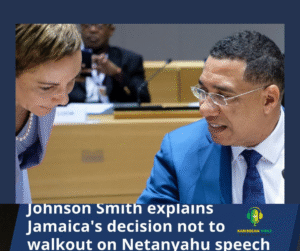
When Israeli Prime Minister Benjamin Netanyahu addressed the United Nations General Assembly last week, diplomats from more than 50 countries staged a dramatic walkout in protest of Israel’s military actions in Gaza and Netanyahu’s rhetoric. Jamaica, however, remained seated.
Minister of Foreign Affairs and Foreign Trade, Kamina Johnson Smith, explained that this decision was consistent with Jamaica’s longstanding diplomatic practice. Our country has always recognized Palestine as a sovereign state and continues to support the two-state solution. But at the same time, Jamaica has chosen to be a voice of reason — one that prioritizes dialogue, engagement, and careful diplomacy.
This choice reflects a broader truth: as a small island nation, Jamaica must be strategic about which battles it takes on. Our influence on the global stage is not measured in military might or economic power, but in how we conduct ourselves as a responsible and respected member of the international community.
Prime Minister Andrew Holness, along with Minister Johnson Smith and the government’s foreign policy team, has worked diligently to maintain strong relationships with influential world leaders. Their approach is deliberate, thoughtful, and focused on protecting Jamaica’s interests first and foremost.
We don’t need to look far for an example of why this caution is necessary. Consider the Cuban medical doctor situation. When U.S. Senator Marco Rubio warned of serious repercussions for countries accused of exploiting Cuban doctors, there were calls for Prime Minister Holness to respond forcefully. Instead, he remained silent, avoiding unnecessary confrontation until Rubio himself visited Jamaica and clarified that the country was not in violation and had nothing to fear. The Prime Minister’s patience and restraint spared Jamaica from potential backlash and showed the importance of not reacting hastily to international pressure.
Diplomacy is technical and requires strategy. Prime Minister Holness has shown time and again that he will never place Jamaica in a position that could harm its standing or its future. While critics — including the People’s National Party and others — may demand more aggressive action, they fail to understand that international relations is a game of chess, not checkers.
And it is precisely because Andrew Holness understands this that he has earned the trust of the Jamaican people, securing a third consecutive term in office. His steady hand ensures that Jamaica’s voice is heard without jeopardizing the very relationships that sustain our nation on the world stage.
In a world where small missteps can have big consequences, Jamaica’s choice to remain seated at the U.N. was not weakness — it was wisdom.
